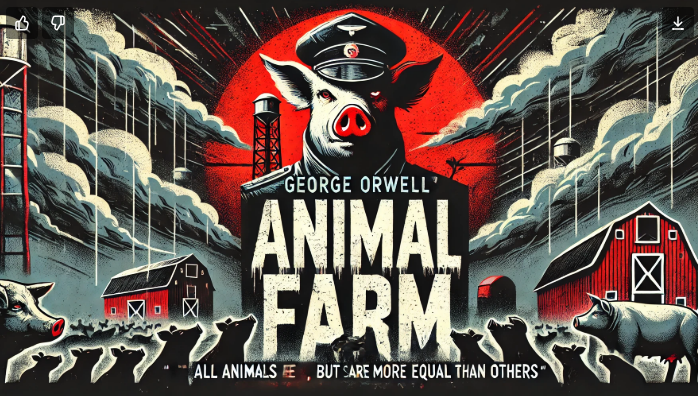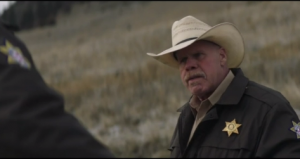Animal Farm: A Study Guide
Key Terms and Definitions
- Animalism: The system of thought and principles developed by the pigs based on Old Major’s teachings, advocating for an animal-run society free from human oppression.
- Beasts of England: The revolutionary song sung by the animals, representing their hopes for freedom and a better future.
- The Battle of the Cowshed: The first battle between the animals and Jones and his men, resulting in a victory for the animals and securing their control of the farm.
- The Battle of the Windmill: The second battle against the humans, led by Frederick, where the windmill is destroyed but the animals eventually drive the humans off the farm.
- Comrade: A term of address used by the animals to signify equality and solidarity amongst themselves.
- Four legs good, two legs bad: A simplified maxim summarizing the principles of Animalism, later altered to accommodate the pigs’ changing ideology.
- Manor Farm: The original and final name of the farm, symbolic of the pigs’ return to human-like tyranny and the abandonment of the revolutionary ideals.
- Napoleon: A large, fierce Berkshire boar who emerges as the dictatorial leader of Animal Farm, utilizing intimidation and manipulation to maintain his power.
- Snowball: An intelligent and eloquent pig who initially shared leadership with Napoleon but is later chased off the farm and scapegoated for any setbacks.
- Squealer: A small, persuasive pig who acts as Napoleon’s propagandist, justifying the pigs’ actions and manipulating the animals’ perception of events.
- Sugarcandy Mountain: A mythical paradise for animals after death, promoted by Moses the raven and representing the false hope of an afterlife offered to oppressed workers.
Short-Answer Quiz
- What is the significance of Old Major’s speech in Chapter 1?
- Explain the role of the pigs in the early stages of the rebellion and the establishment of Animal Farm.
- How does the concept of “equality” change throughout the novel? Provide specific examples.
- Compare and contrast Snowball and Napoleon’s leadership styles and visions for Animal Farm.
- Describe the significance of the Seven Commandments and how they are gradually altered by the pigs.
- Explain the purpose and outcome of the Battle of the Cowshed.
- How does Squealer use propaganda and manipulation to control the animals?
- What role does the character of Boxer play in the novel? How does his fate contribute to the overall theme?
- What is the significance of the windmill and its destruction and rebuilding?
- How does the ending of the novel reflect the corruption of the pigs and the betrayal of the revolution’s initial ideals?
Answer Key
- Old Major’s speech lays out the principles of Animalism and inspires the animals to rebel against human oppression. It sparks the initial flame of revolution and provides a vision of a utopian future.
- The pigs, due to their intelligence, quickly take charge of organizing and educating the other animals. They develop the philosophy of Animalism and assume leadership roles after the rebellion.
- Initially, “equality” means all animals are equal in rights and status. However, the pigs gradually create a hierarchy where they are “more equal” than others, enjoying privileges and exploiting their power. Examples include taking the milk and apples, sleeping in beds, and later walking on two legs.
- Snowball is charismatic and idealistic, focusing on education and technological advancement like the windmill. Napoleon is more ruthless and pragmatic, prioritizing control and consolidating his power.
- The Seven Commandments, initially representing the core principles of Animalism, are subtly altered by the pigs to justify their actions and growing tyranny. This highlights the insidious nature of power and how ideologies can be manipulated.
- The Battle of the Cowshed symbolizes the animals’ successful overthrow of human control and their initial unity in defending their newfound freedom. It bolsters their confidence and solidifies their belief in Animalism.
- Squealer uses propaganda techniques like manipulating statistics, altering history, and using persuasive language to control information and shape the animals’ understanding of events in a way that benefits the pigs.
- Boxer represents the hardworking, loyal, and uncritical working class. His blind faith in Napoleon and tragic demise demonstrate how easily dedication and strength can be exploited by those in power.
- The windmill symbolizes progress and hope for a better future. Its destruction and subsequent rebuilding demonstrate the animals’ tireless labor and the pigs’ ability to manipulate them into serving their own agenda.
- The novel’s ending, where the pigs become indistinguishable from the humans, highlights the cyclical nature of oppression and the corruption that often accompanies power. The revolution’s ideals are utterly betrayed, leaving a sense of disillusionment and a warning against unchecked authoritarianism.
Essay Questions
- Analyze the ways in which Animal Farm functions as an allegory for the Russian Revolution.
- Discuss the role of language as a tool for both empowerment and control in the novel.
- Examine the theme of education and the dangers of ignorance as depicted in Animal Farm.
- Explore the different types of power dynamics present in the novel, analyzing how they shift and evolve over time.
- Discuss the novel’s message about the potential for corruption and the dangers of unchecked power within any social or political system.

































CLICK HERE FOR COMMENTS